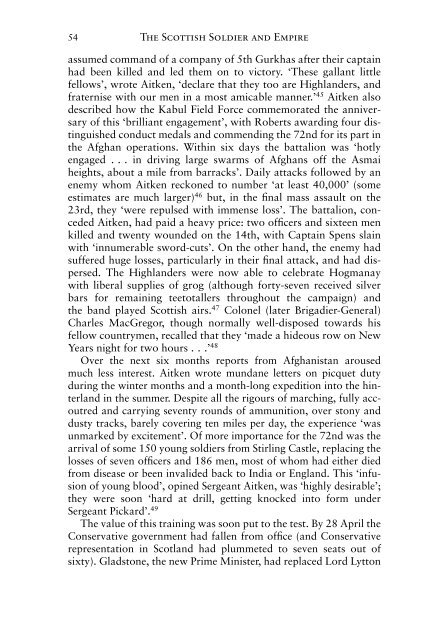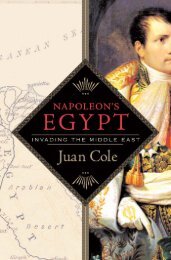The Scottish soldier and Empire, 1854-1902 - Reenactor.ru
The Scottish soldier and Empire, 1854-1902 - Reenactor.ru
The Scottish soldier and Empire, 1854-1902 - Reenactor.ru
Create successful ePaper yourself
Turn your PDF publications into a flip-book with our unique Google optimized e-Paper software.
54 <strong>The</strong> <strong>Scottish</strong> Soldier <strong>and</strong> <strong>Empire</strong><br />
assumed comm<strong>and</strong> of a company of 5th Gurkhas after their captain<br />
had been killed <strong>and</strong> led them on to victory. ‘<strong>The</strong>se gallant little<br />
fellows’, wrote Aitken, ‘declare that they too are Highl<strong>and</strong>ers, <strong>and</strong><br />
fraternise with our men in a most amicable manner.’ 45 Aitken also<br />
described how the Kabul Field Force commemorated the anniversary<br />
of this ‘brilliant engagement’, with Roberts awarding four distinguished<br />
conduct medals <strong>and</strong> commending the 72nd for its part in<br />
the Afghan operations. Within six days the battalion was ‘hotly<br />
engaged . . . in driving large swarms of Afghans off the Asmai<br />
heights, about a mile from barracks’. Daily attacks followed by an<br />
enemy whom Aitken reckoned to number ‘at least 40,000’ (some<br />
estimates are much larger) 46 but, in the final mass assault on the<br />
23rd, they ‘were repulsed with immense loss’. <strong>The</strong> battalion, conceded<br />
Aitken, had paid a heavy price: two officers <strong>and</strong> sixteen men<br />
killed <strong>and</strong> twenty wounded on the 14th, with Captain Spens slain<br />
with ‘innumerable sword-cuts’. On the other h<strong>and</strong>, the enemy had<br />
suffered huge losses, particularly in their final attack, <strong>and</strong> had dispersed.<br />
<strong>The</strong> Highl<strong>and</strong>ers were now able to celebrate Hogmanay<br />
with liberal supplies of grog (although forty-seven received silver<br />
bars for remaining teetotallers throughout the campaign) <strong>and</strong><br />
the b<strong>and</strong> played <strong>Scottish</strong> airs. 47 Colonel (later Brigadier-General)<br />
Charles MacGregor, though normally well-disposed towards his<br />
fellow countrymen, recalled that they ‘made a hideous row on New<br />
Years night for two hours . . .’ 48<br />
Over the next six months reports from Afghanistan aroused<br />
much less interest. Aitken wrote mundane letters on picquet duty<br />
during the winter months <strong>and</strong> a month-long expedition into the hinterl<strong>and</strong><br />
in the summer. Despite all the rigours of marching, fully accoutred<br />
<strong>and</strong> carrying seventy rounds of ammunition, over stony <strong>and</strong><br />
dusty tracks, barely covering ten miles per day, the experience ‘was<br />
unmarked by excitement’. Of more importance for the 72nd was the<br />
arrival of some 150 young <strong>soldier</strong>s from Stirling Castle, replacing the<br />
losses of seven officers <strong>and</strong> 186 men, most of whom had either died<br />
from disease or been invalided back to India or Engl<strong>and</strong>. This ‘infusion<br />
of young blood’, opined Sergeant Aitken, was ‘highly desirable’;<br />
they were soon ‘hard at drill, getting knocked into form under<br />
Sergeant Pickard’. 49<br />
<strong>The</strong> value of this training was soon put to the test. By 28 April the<br />
Conservative government had fallen from office (<strong>and</strong> Conservative<br />
representation in Scotl<strong>and</strong> had plummeted to seven seats out of<br />
sixty). Gladstone, the new Prime Minister, had replaced Lord Lytton

















